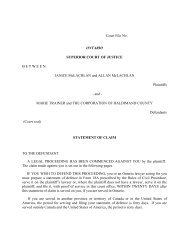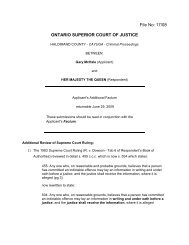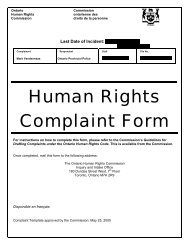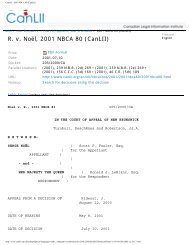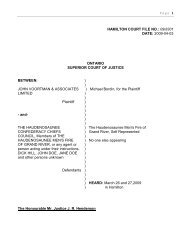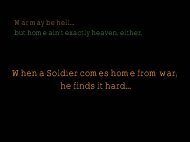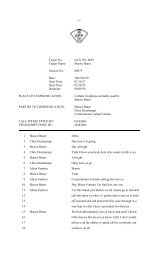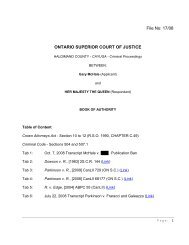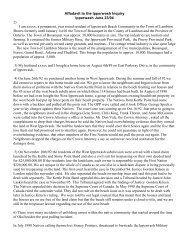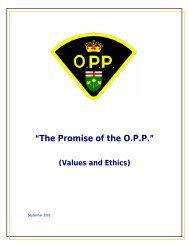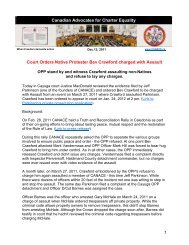Other People's Wars - Caledonia Wake Up Call
Other People's Wars - Caledonia Wake Up Call
Other People's Wars - Caledonia Wake Up Call
Create successful ePaper yourself
Turn your PDF publications into a flip-book with our unique Google optimized e-Paper software.
<strong>Other</strong> Peoples’ <strong>Wars</strong> – Chapter Onemore bloody-minded, with mindsets that divide the world into theenlightened/destined-for-salvation “us,” and the unenlightened/disposable “them”.Aum Shinri Kyo, Timothy McVeigh, and al Qaeda respectively saw the generalpopulation of the Western world as doomed, hopelessly compromised or as theenemy itself.9. Expanded target lists: The essence of terrorism includes its seeming randomnessand talent for searching out weakness. The Provisional Wing of the IRAconsidered “legitimate military targets” to include soldiers on leave in Europe; thewives and children of soldiers; ceremonial parades where tourists are present; aRemembrance Day Ceremony; and recruiting booths at trade fairs. LatinAmerican death squads in countries that had been bedeviled by guerrillas haveseldom bothered to hunt armed insurgents in the jungle when there were – forexample – unarmed union organizers, schoolteachers, nuns, peasants, or irritatingjournalists to murder. The Islamic Fundamentalists tend to be even lessdiscriminating.10. Assured Indentity: Modern terrorist groups tend to establish a clear modusoperandi that precludes the need to send communiqués. Older groups used tosend letters to the media to describe why they had committed their actions,placing their deeds in an ideological framework while usually blaming theauthorities or the target for the terrorists’ actions, and to seek publicity. Moderngroups often do not bother because the manner of their actions and selection oftargets speaks for itself. Moreover, many of them have no wish to communicatewith their target at all. However, in some cases, an insurgent group may becompeting for influence and prestige in another audience altogether. Forexample, sundry Palestinian groups might not bother to send a communiqué to theIsraelis after committing an attack, except that status and influence inside much ofthe Palestinian community depends on a demonstrated ability to harm the Israelis,and it is vitally important to claim credit for an attack to this audience.Except for a few highly specialized single interest groups (such as the AnimalLiberation Front and related “ecotage” groups) virtually all modern terrorists havebecome international in scope and far more dangerous than the progenitor groups of thelate 1960s and ‘70s. They are tougher, more resilient, less likely to be easily confronted,and far more likely to push roots deep into the broader community of their culturalcompatriots. There is no easy way to deal with them.The Marxist and quasi-Marxist mindsets that dominated the terrorists of the 1960s and‘70s involved a revolutionary endgame in which the terrorists could both provoke a civilwar, and then win it. They saw the authorities of their own nations as the governmentthey sought to supplant, and – wherever they grew large enough – sought to createalternate institutions to rival those of the government – e.g. people’s courts and schools.While most contemporary groups are usually (but not always) much less interested inthe annoyances of providing responsible government, they still must sometimes provideinstitutions of their own within the community they wish to lead. Hizbollah and Hamas,for example, provide schools, orphanages, and hospitals in Lebanon and the Palestiniancommunity. <strong>Other</strong> groups claim to provide such benefits – refugee relief and16



